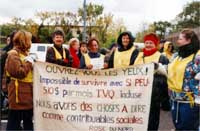Navigation
 Home
Home
 WHO WE ARE
WHO WE ARE
 OUR DEMANDS
OUR DEMANDS
 OUR ACTIONS
OUR ACTIONS
 OUR MAIN FIELDS OF ACTION: The Common Good and Access to Resources, Peace and demilitarisation, Women's Work and Violence against Women
OUR MAIN FIELDS OF ACTION: The Common Good and Access to Resources, Peace and demilitarisation, Women's Work and Violence against Women
 Become a member
Become a member
 News
News
 Agenda
Agenda
 Structure: IC, Countries and Participating bodies, International meetings
Structure: IC, Countries and Participating bodies, International meetings
 Newsletters
Newsletters
 Publications
Publications
 2000 - Sexism and Globalization, 2000 Good Reasons to March
2000 - Sexism and Globalization, 2000 Good Reasons to March
 2003 World Social Forum
2003 World Social Forum
 A Change of Course, The Millenium Development Goals (MDGs) through the Lens of the Women's Global Charter for Humanity, August 2005
A Change of Course, The Millenium Development Goals (MDGs) through the Lens of the Women's Global Charter for Humanity, August 2005
 A Score for Women’s Voices
A Score for Women’s Voices
 Advocacy Guide to Women's World Demands, 2000
Advocacy Guide to Women's World Demands, 2000
 Appeal of the World March of Women for the Construction of a Just, Equal, Cooperative, Democratic and Peaceful World
Appeal of the World March of Women for the Construction of a Just, Equal, Cooperative, Democratic and Peaceful World
 Changing the World Step by Step, 2000
Changing the World Step by Step, 2000
 ECONOMICS IN QUESTION: A WOMEN’S PERSPECTIVE
ECONOMICS IN QUESTION: A WOMEN’S PERSPECTIVE
 G8 AND WOMEN: WORLDS APART
G8 AND WOMEN: WORLDS APART
 Information about demand V-6 concerning sex trafficking of women and girls
Information about demand V-6 concerning sex trafficking of women and girls
 Information Document on Lesbian Rights (1999)
Information Document on Lesbian Rights (1999)
 Letter to Kofi Annan, UN General Secretary, October 17, 2000
Letter to Kofi Annan, UN General Secretary, October 17, 2000
 Letter to the IMF and the World Bank, October 16, 2000
Letter to the IMF and the World Bank, October 16, 2000
 Supporting Document 1 to the Charter
Supporting Document 1 to the Charter
 Supporting Document 2 to the Charter
Supporting Document 2 to the Charter
 The World March of Women 1998-2008: A Decade of International Feminist Struggle
The World March of Women 1998-2008: A Decade of International Feminist Struggle
 The World March of Women 2010 - Third International Action
The World March of Women 2010 - Third International Action
 WMW at the Global Forum on Financing the Right to Sustainable and Equitable Development
WMW at the Global Forum on Financing the Right to Sustainable and Equitable Development
 Women on the March, 2002
Women on the March, 2002

|
April 2002 - Eliminate Poverty in All Stages of Life
|
Access to means of meeting basic social and economic needs
A roof over our heads
Housing is another basic need to be met. Québec women demanded a large-scale program to build social housing. (The budgets earmarked for this item should be increased to 1% of the federal budget, Canadian women argued.)
Similar demands were made in Mexico, the Central African Republic, Cameroon, Chad, Honduras, India, and Nicaragua. In France and Switzerland, women demanded, "for all women and men, truly equal access to housing, with the possibility of eventual home owner status in social housing for the homeless and people housed inadequately, particularly single women with or without children."
Venezuelan women called for "guaranteed housing and social insurance for women who stay at home."
|
|

|
Social rights for women also

Illustration : Magazine « Femmes prévoyantes Socialistes » (Belgique) |
Large numbers of women demanded legislation (Arab countries and Québec, among others) and active government policies (Costa Rica, Ghana, Haiti, India, Tunisia) to put an end to situations of extreme poverty.
The fight to secure and maintain social rights goes beyond the gap between developed and developing countries. Considered unimportant by neoliberal economic policy, social budgets are the first to be slashed under structural adjustment programs (SAPs), implemented to reduce poor countries' external debt. These cutbacks are part of the orders given by the International Monetary Fund and the World Bank when they go in to "help" countries.
Since women are more fragile socially speaking and less numerous than men in the job market-or working for less pay-women are the first victims of the SAPs.
|
Drawing from the platform of world demands, participating groups insisted that countries' foreign debt be cancelled and the resulting funds be allocated to social programs for women.
Other demands were made to ensure gender equality in this sphere (Bolivia, Brazil, India, Jordan, Kurdistan, Mexico, Tunisia). In New Zealand and in Europe, women showed concern over rising poverty and insecurity, and wanted current social systems to be "scaled upwards" so that women can "live with dignity."
"The money needed exists: excessive military budgets and the nuclear arms buildup expand to the detriment of satisfying [social] needs," a Frenchwoman wrote.
In Canada women demanded respect for social and economic rights, the right to receive their own social assistance, and an old age pension calculated on the basis of their individual income, not on the basis of family income.
This particular attention to older women with low incomes, especially if they did not have a job outside the home, was found in Bolivia, Brazil, Chile, Croatia, France, Haiti, Québec. Korean women called for special programs to be set up for women farmers and women with disabilities. Meeting in mid-April 2000, in Bucharest, Romanian, Ukrainian and Yugoslavian women emphasized the demand of recognition of women's unpaid work and protection for women who are doubly threatened (single women, older women, women farmers, young women, and women with disabilities).

Because Bread and Roses means living in dignity
(October 9, 2000, in Québec City).
(Photo Elisabeth Blanchet)
|

|
Copyrights
:
CC by-nc-sa 2.0
Last modified
2006-03-23 03:09 PM
This item is available in
Français,
English,
Español
|
|





